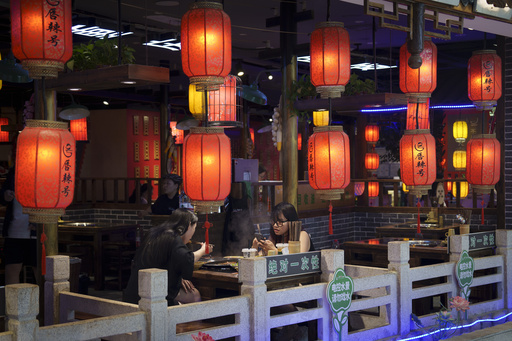WASHINGTON (AP) — Global views toward China appear to be divided between high-income and middle-income countries, and the gap apparently is the widest among China’s neighbors in the Indo-Pacific region, according to a newly released poll from the Pew Research Center that surveyed people in 35 countries.
Fifteen out of the 18 high-income countries surveyed expressed unfavorable views toward China, with Japan and Australia leading the pack with more than 8 in 10 in those countries viewing China negatively. By comparison, 14 of the 17 middle-income countries had rosier views of China, and Thailand held the most favorable views of China, with 80% of adults having a positive view toward China, according to Pew.
The report was released Tuesday as the leaders of NATO nations were convening in Washington to discuss the war in Ukraine but also to express concerns over China. The Western military alliance is expected to deepen cooperation with its four Indo-Pacific partners — Japan, South Korea, Australia and New Zealand — at a time of intensifying competitions between Washington and Beijing over global governance.
In the Indo-Pacific region, Washington is forging alliances and partnerships with like-minded governments to push back at Beijing’s expanding influences. According to the Pew report, many countries surveyed in the region were very or somewhat concerned about China’s territorial disputes.
The Philippines, locked in a dispute with China over the Second Thomas Shoal in the South China Sea, was the most worried, with about 9 in 10 Filipinos expressing concerns. A similar share of those in South Korea and Japan were concerned, and about 8 in 10 in Australia were. All three countries are members of an informal grouping of four NATO partners in the Indo-Pacific. The fourth one, New Zealand, was not part of the Pew survey. The three countries plus India were also among the least likely of those surveyed in the Asia-Pacific region to describe China as contributing to global peace and stability.
Thailand, which has no territorial dispute with China, was the least worried. About 4 in 10 expressed concerns over China’s territorial disputes, and 80% of Thai people said China contributes to peace and stability around the world.
Overall in the Asia-Pacific region, Japan, Australia, South Korea, the Philippines and India held most unfavorable views of China, while Thailand, Singapore, Malaysia and Sri Lanka exhibited most favorable views of China, according to Pew.
In another sign of the sharper divide in the region, Chinese President Xi Jinping got some of his highest and lowest ratings among the country’s neighbors. Nine in 10 people in Japan said they have “not too much” confidence or “none at all” in Xi to do the right thing regarding world affairs, the lowest confidence of the 35 countries surveyed. Thailand and Singapore, however, showed relatively high confidence in Xi — with roughly 6 in 10 saying the Chinese leader could be counted on to do the right thing. The ratings from Thailand and Singapore were among the highest of the countries surveyed.
Across the globe, the divide over China between the high-income countries and middle-income ones became clearer this year, when Pew surveyed 35 countries, up from last year’s 24 nations that included only eight middle-income countries.
In North America and Europe, all 12 countries surveyed except Greece viewed China more unfavorably than favorably. In Africa and Latin America, all 10 countries Pew had polled said they held at least slightly more positive than negative views of China.
The results of the global survey were based on telephone, face-to-face and online interviews conducted under several polling groups. The margins of error varied from 2.4 to 4.9 percentage points.
Source: post





